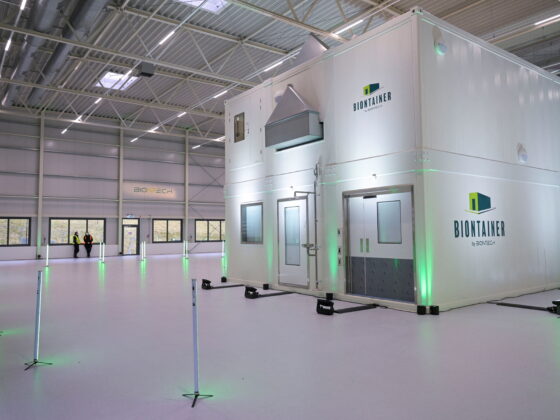Since the turn of the century, we have been in the midst of the “Fourth Industrial Revolution,” according to the World Economic Forum (WEF). Klaus Schwab, the Forum’s founder and CEO, describes this as a technical revolution accompanied by nothing less than a dramatic transformation of human civilization that “will radically affect the way we live, work, and engage with each other.” This transformation will usher in an entirely “new chapter in human development.”
The availability and fusion of new, “quite astonishing technology,” according to Klaus Schwab, is a distinguishing aspect of the Fourth Industrial Revolution. This, he claims, will eventually result in “the blurring of the boundaries between the physical, digital, and biological domains.” This mostly pertains to the application of bio- and neurotech, implantable technologies, and the Internet of Bodies (IoB).
The Cyborgization of Society: How the WEF seeks to turn you into a spineless drone
These are technologies that are less concerned with the human surroundings and more concerned with transforming the human person itself, having a long-term impact on its being and identity. With the Fourth Industrial Revolution—according to Klaus Schwab—we are facing “a metamorphosis of the human being the likes of which we have never encountered before”.
THE MECHANIZATION OF MAN
Schwab’s statements speak of the traditional dream of a new, more ideal human being. This is a long-standing dream. It is nothing novel or special. A diverse range of intellectuals often aspired for a more perfect human being, while remaining confident of humanity’s unending growth. This conviction in development was sometimes accompanied by an unwavering faith in scientific advances and, later, in the potential connected with the widespread application of technology.
The new man of the Fourth Industrial Revolution, on the other hand, differs fundamentally from prior ideas of man created by Friedrich Nietzsche, or even Karl Marx, for example. Moral ideals, character structure, and societal conditions have all been replaced by technology. Humans are supposed to progress simply through the successful application of new technologies, rather than through education, upbringing, practical experience, or revolutionary action. According to the World Economic Forum’s stated intention, the human being emerging from the future economic transition will predominantly be the result of new technology. This transhumanist future vision seeks to perfect and further perfect man through the application of new technology processes and technological interventions in his body. It promotes an elitist and repressive technocratic image of man, the repercussions of which cannot even be estimated at this time.
NEUROTECHNOLOGIES FOR BRAIN AND BEHAVIOR CONTROL
According to the World Economic Forum, neurotech is at the heart of the Fourth Industrial Revolution. After all, they provide for “unique insights—not only into how the brain interacts with its physical and social environment, but also into novel ways of experiencing life.” They could also assist to “advance the industry of mechanizing the human body” by tackling a variety of neurological illnesses and physical limitations.
It is not uncommon for the military to provide the required financing for neurotechnologies and other cutting-edge research. There, they are initially placed in the “defensive context,” and then their results are used. As a result, the human brain—particularly “in the border area of war and security”—is the focus of attention. According to Schwab, crossing a national border may need a comprehensive brain scan in the future to assess a person’s security risk.
Employers will be increasingly interested in using neurotechnologies to boost performance, as well as to evaluate job applicants and monitor staff. The usage of biometric technology in the workplace, as well as tracking via radio frequency identification (RFID), may lead to “employers directly or indirectly monitoring the brains of employees” in the future. Increased use of brain-monitoring gadgets is also on the horizon for the retail sector. This would allow firms to see through key consumer decision-making tendencies and more readily encourage consumers to behave in a desired manner.
Fundamentally, neurotechnologies are proving to be ideal for affecting people’s awareness and thinking. Furthermore, such technology can aid in decoding ideas, repairing “errors” in the brain, and “enhancing” its function. In a society driven by algorithms and pervasive data collecting, access to even a person’s most private thoughts cannot be ruled out.
DESIGNER BABIES AND BIOTECHNOLOGY
The Forum then sees the next logical step as the broad application of synthetic biology, which results in the production of designer creatures. This would eventually usher humanity into “a whole new age of metabolic engineering and synthetic biology.” This should allow one to create organisms for oneself. “They can be customized by writing their DNA. Ultimately, this is about nothing less than interfering with future generations’ genetic code,” according to Schwab.
IMPLANTS FOR HUMAN BODY OPTIMIZATION
The World Economic Forum has been discussing an Internet of Bodies (IoB) in its publications for several months. Recent technological advancements have heralded the IoB’s new era. This period is distinguished by an unparalleled number of networked devices and sensors that can be attached to the human body (non-invasively), implanted, or otherwise introduced into the body (invasive). Invasive technologies include digital pills, the first use of which was allowed in the United States in 2017. They have microscopic sensors that are linked to a medicine, activated in the patient’s stomach, and provide data.
The Internet of Bodies makes it fundamentally possible to generate massive amounts of biometric and behavioral data. The human body will be changed into some kind of “technology platform” as a result of this process. However, not everyone will be able to pay the sometimes prohibitively expensive technical optimization of their physical and mental processes, which will inevitably lead to additional discrimination against specific groups and hence a widening of society’s already existent social divide. In this event, “a gap is likely to grow up between all those who technically enhance their bodies and those who are left behind,” according to Schwab.
EPOCHAL CHANGE WITHOUT DEMOCRACY
SHOCK STRATEGY AND “OPPORTUNITY” FOR AUTHORITARIAN CENTRALISM DURING COVID-19
As a result, they regard the pandemic as a “fundamental turning point” in global development. They claim that the time has finally come for a paradigm shift. In the following decades, “a new world with a new normal may develop.”
The World Economic Forum’s organizers regard the crisis caused by the Coronavirus pandemic as a once-in-a-lifetime opportunity to carry out a “Great Reset” of the capitalist economic order. They are concerned with the global implementation of far-reaching economic and social reforms, which will result in a fundamental upheaval of the entire previous economic and lifestyle system. They rely on enhanced centralism with strong authoritarian elements in the measures they intend to implement to build their technocratic agenda. Within a global regulatory framework (global governance), “‘bequeathed’ actors must consider themselves as elements of a globally ramified power system that can only succeed through increasingly cooperative forms of engagement.”
Concerning the worldwide ‘catastrophe’ caused by the pandemic, Schwab and Malleret believe that it is precisely deep, existential crises that “carry the promise for change.” They even have the nerves to say that the Corona pandemic is similar to World War II in terms of transformative force because “both have the potential of a transformative crisis of previously unknown dimensions.” Just as the Second World War caused a “fundamental transformation in the world order and the world economy,” the “moment for a paradigm shift” has arrived today. The pandemic expedited this transformation by acting as a catalyst for technology changes that had already begun before the crisis, Schwab continues.
The thesis of the close relationship between a crisis and later social change dates back to economist Milton Friedman, who died in 2006 and was one of the most important economists of recent decades.
“Only a crisis, genuine or perceived, leads to meaningful change. What happens next in such a crisis is determined by the ideas that are in circulation.” — Milton Friedman
This speech by Friedman is referred to by Naomi Klein as the key strategic ideology that would become a kind of chant for his movement: the shock doctrine. He claims that the strategy entails “using periods of communal traumatic experience to compel dramatic social and economic change.” Here’s how the shock doctrine works:
An initial disaster shocks practically the whole society, softening it for the transformations that will follow. “Shocked cultures frequently accept things they would otherwise strongly reject. Companies and politicians would take advantage of people’s fear and disorientation as a result of the ‘shock’ to impose an economic shock therapy. A severe collective trauma that either temporarily suspends or completely stops democratic activities is required for this to be implemented without restriction.” This necessitates authoritarian settings and the focused deployment of the state’s regulatory agencies.
A cabinet strategy paper on COVID-19 containment, initially confidential, adopts and applies Friedman’s shock strategy. The study was written by a group of academics, the bulk of whom were economists, and it is likely that it influenced the federal government’s decision to impose the lockdowns, which restricted the economy and fundamental rights. Instead of presenting individuals with real information and educating them to build trust and alleviate existing worries, the scientists took an entirely different strategy. Thus, they openly support a policy whose purpose must be to instigate terror in the peoples’ minds through a “desired shock effect.”
Schwab and Malleret saw the shock effect of a crisis on people as a wonderful opportunity for social reform to occur. The Corona pandemic, for example, is “a huge shock” that “brings with it the uneasy confidence that it will have both unexpected and extraordinary implications.” Despite the difficulty of the changes ahead, Schwab believes the pandemic will hasten a systemic transition that was already underway before the crisis. These include “increasing technological power” and rapid automation. For many individuals, this means that the technologization of their lives will accelerate quickly, as a result of which “life as they have known it up to now will rip apart at the seams with alarming speed”. At the same time, however, “the technologization of life provides an opportunity, and this is also the real meaning of the Fourth Industrial Revolution.”
REPRESSION TECHNOLOGY—CONTROL AND SURVEILLANCE
Furthermore, governments face a genuine risk of combining technologies to undermine civil society organizations and citizen groups that demand for transparency in government and economic activity. Finally, constraining such organization’s’ independence and operations through laws and other measures further reduces the space for civil society. As a result, the instruments of the Fourth Industrial Revolution enable “new types of surveillance and new control possibilities that run antithetical to healthy, open communities.” Additionally, as the digital world developed and evolved, the Corona pandemic improved options for human observation and control.
In this context, “contact tracing,” which was supposedly critical in countering COVID-19, appears to be on track to becoming “a facilitator of mass surveillance.”
Corporations, in particular, have become increasingly interested in tracking their employees’ health. As a result, it is reasonable to expect increased surveillance of dependent employees in the future. This could be attributed to concerns about their health and safety. According to Schwab and Malleret, technical surveillance tools will most likely stay in place even after the pandemic. This is evident, they write because “employers have no reason to remove a monitoring system once it has been installed, especially if one of the indirect benefits of monitoring is to check worker productivity.”
Technical solutions implemented to contain a pandemic, on the other hand, are also ideal for expanding a surveillance state. They can also be employed as political surveillance technology, allowing for greater human control as well as additional coercive tactics. Schwab and Malleret even advocate for “a global surveillance network” in their book. According to them, “once released,” “the genie of technical monitoring” will not be “put back into the bottle” in the post-pandemic period and will thus be with communities for a long time. Hooray.
DECAY, CHAOS, AND DYSTOPIA
There will also be personal tragedies, as well as the hatred and despair of people from all walks of life. The emergence of social unrest must thus be seen as one of the most serious threats, with such a development—in their opinion—even “generating to social breakdown and political collapse” in extreme situations. However, history has shown that prospects of eliminating current inequities “are unlikely without accompanying severe social disturbance.”
To be sure, governments and corporations had employed “increasingly sophisticated technologies to monitor and occasionally control citizens and employees” in earlier years. However, the potential offered by the Corona crisis could have a considerably greater influence on individual rights and liberties, making it a “watershed moment in surveillance history.” Such a scenario would result in the growth of authoritarian tendencies and more repression. Perhaps some individuals will soon discover that “their country has suddenly turned into a place where they no longer want to live,” as Schwab and Malleret rightfully worry.
Overall, it “all comes down to individuals and values,” summarizes Klaus Schwab. That is why it must be feasible to create a future worth living in because “in its worst, dehumanized form, the Fourth Industrial Revolution does certainly have the ability to turn people into machines without a heart or a soul,” says Schwab. Furthermore, there had never been a moment “that arrived with more promise, but also with such immense looming doom.” As a result, the utopia of mankind’s technological perfection may lead sooner than predicted to a dystopian society that offers no future worth living for humans.
The yearning for a new, designed human being did not emerge accidentally, but rather as a result of a protracted historical evolution. However, such a growth is not predetermined nor necessarily imperative for humanity. As a result, it is correctable. Nobody has to accept it as fate. We’ve been warned!














